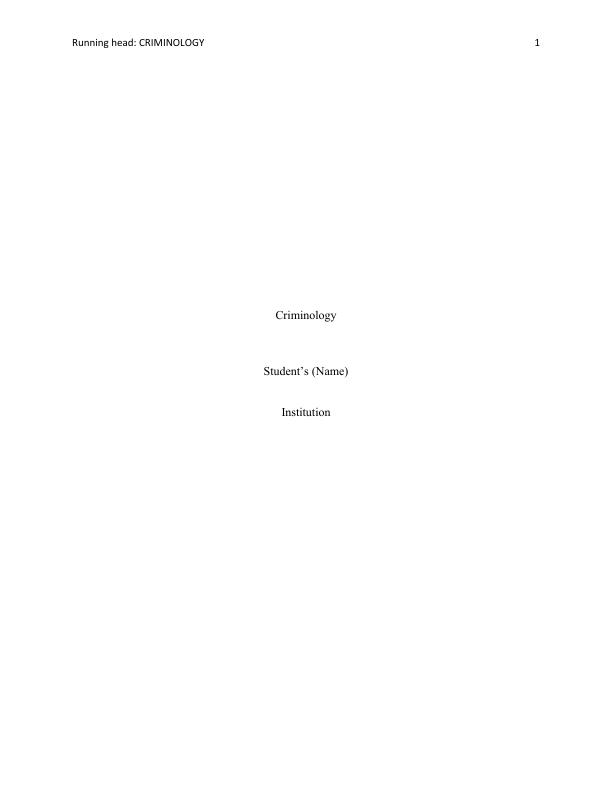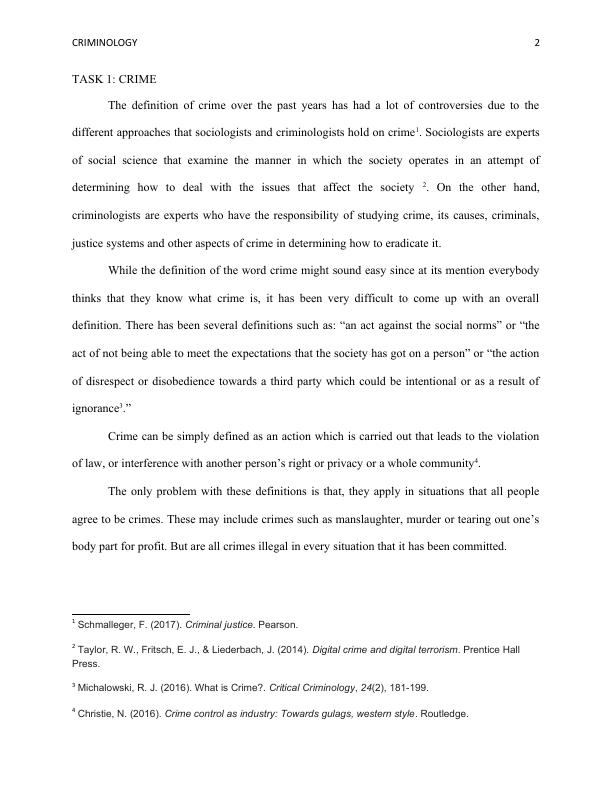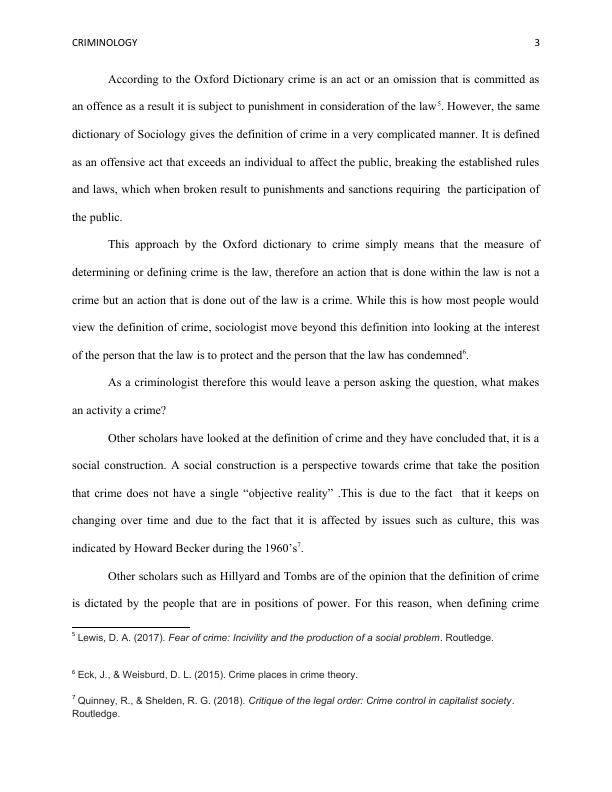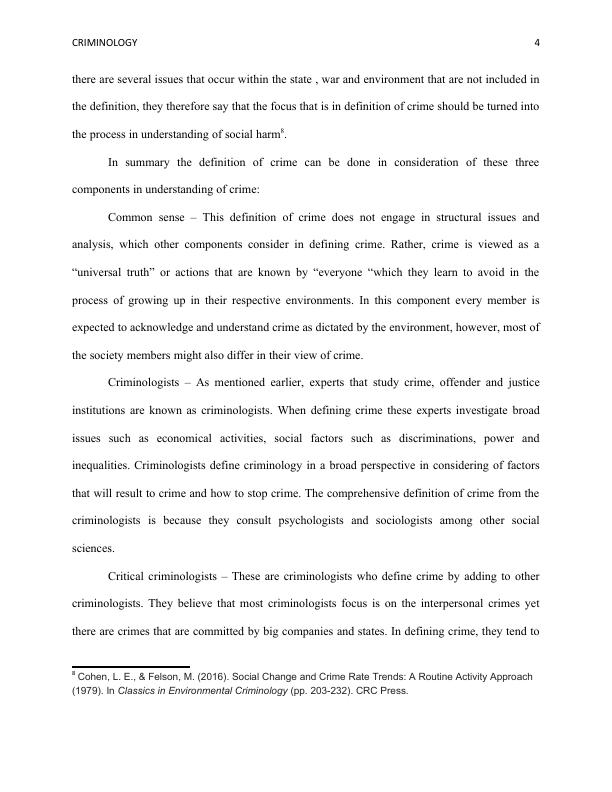Definition of Criminologists
Added on 2022-05-31
15 Pages3835 Words37 Views
Running head: CRIMINOLOGY 1
Criminology
Student’s (Name)
Institution
Criminology
Student’s (Name)
Institution

CRIMINOLOGY 2
TASK 1: CRIME
The definition of crime over the past years has had a lot of controversies due to the
different approaches that sociologists and criminologists hold on crime1. Sociologists are experts
of social science that examine the manner in which the society operates in an attempt of
determining how to deal with the issues that affect the society 2. On the other hand,
criminologists are experts who have the responsibility of studying crime, its causes, criminals,
justice systems and other aspects of crime in determining how to eradicate it.
While the definition of the word crime might sound easy since at its mention everybody
thinks that they know what crime is, it has been very difficult to come up with an overall
definition. There has been several definitions such as: “an act against the social norms” or “the
act of not being able to meet the expectations that the society has got on a person” or “the action
of disrespect or disobedience towards a third party which could be intentional or as a result of
ignorance3.”
Crime can be simply defined as an action which is carried out that leads to the violation
of law, or interference with another person’s right or privacy or a whole community4.
The only problem with these definitions is that, they apply in situations that all people
agree to be crimes. These may include crimes such as manslaughter, murder or tearing out one’s
body part for profit. But are all crimes illegal in every situation that it has been committed.
1 Schmalleger, F. (2017). Criminal justice. Pearson.
2 Taylor, R. W., Fritsch, E. J., & Liederbach, J. (2014). Digital crime and digital terrorism. Prentice Hall
Press.
3 Michalowski, R. J. (2016). What is Crime?. Critical Criminology, 24(2), 181-199.
4 Christie, N. (2016). Crime control as industry: Towards gulags, western style. Routledge.
TASK 1: CRIME
The definition of crime over the past years has had a lot of controversies due to the
different approaches that sociologists and criminologists hold on crime1. Sociologists are experts
of social science that examine the manner in which the society operates in an attempt of
determining how to deal with the issues that affect the society 2. On the other hand,
criminologists are experts who have the responsibility of studying crime, its causes, criminals,
justice systems and other aspects of crime in determining how to eradicate it.
While the definition of the word crime might sound easy since at its mention everybody
thinks that they know what crime is, it has been very difficult to come up with an overall
definition. There has been several definitions such as: “an act against the social norms” or “the
act of not being able to meet the expectations that the society has got on a person” or “the action
of disrespect or disobedience towards a third party which could be intentional or as a result of
ignorance3.”
Crime can be simply defined as an action which is carried out that leads to the violation
of law, or interference with another person’s right or privacy or a whole community4.
The only problem with these definitions is that, they apply in situations that all people
agree to be crimes. These may include crimes such as manslaughter, murder or tearing out one’s
body part for profit. But are all crimes illegal in every situation that it has been committed.
1 Schmalleger, F. (2017). Criminal justice. Pearson.
2 Taylor, R. W., Fritsch, E. J., & Liederbach, J. (2014). Digital crime and digital terrorism. Prentice Hall
Press.
3 Michalowski, R. J. (2016). What is Crime?. Critical Criminology, 24(2), 181-199.
4 Christie, N. (2016). Crime control as industry: Towards gulags, western style. Routledge.

CRIMINOLOGY 3
According to the Oxford Dictionary crime is an act or an omission that is committed as
an offence as a result it is subject to punishment in consideration of the law5. However, the same
dictionary of Sociology gives the definition of crime in a very complicated manner. It is defined
as an offensive act that exceeds an individual to affect the public, breaking the established rules
and laws, which when broken result to punishments and sanctions requiring the participation of
the public.
This approach by the Oxford dictionary to crime simply means that the measure of
determining or defining crime is the law, therefore an action that is done within the law is not a
crime but an action that is done out of the law is a crime. While this is how most people would
view the definition of crime, sociologist move beyond this definition into looking at the interest
of the person that the law is to protect and the person that the law has condemned6.
As a criminologist therefore this would leave a person asking the question, what makes
an activity a crime?
Other scholars have looked at the definition of crime and they have concluded that, it is a
social construction. A social construction is a perspective towards crime that take the position
that crime does not have a single “objective reality” .This is due to the fact that it keeps on
changing over time and due to the fact that it is affected by issues such as culture, this was
indicated by Howard Becker during the 1960’s7.
Other scholars such as Hillyard and Tombs are of the opinion that the definition of crime
is dictated by the people that are in positions of power. For this reason, when defining crime
5 Lewis, D. A. (2017). Fear of crime: Incivility and the production of a social problem. Routledge.
6 Eck, J., & Weisburd, D. L. (2015). Crime places in crime theory.
7 Quinney, R., & Shelden, R. G. (2018). Critique of the legal order: Crime control in capitalist society.
Routledge.
According to the Oxford Dictionary crime is an act or an omission that is committed as
an offence as a result it is subject to punishment in consideration of the law5. However, the same
dictionary of Sociology gives the definition of crime in a very complicated manner. It is defined
as an offensive act that exceeds an individual to affect the public, breaking the established rules
and laws, which when broken result to punishments and sanctions requiring the participation of
the public.
This approach by the Oxford dictionary to crime simply means that the measure of
determining or defining crime is the law, therefore an action that is done within the law is not a
crime but an action that is done out of the law is a crime. While this is how most people would
view the definition of crime, sociologist move beyond this definition into looking at the interest
of the person that the law is to protect and the person that the law has condemned6.
As a criminologist therefore this would leave a person asking the question, what makes
an activity a crime?
Other scholars have looked at the definition of crime and they have concluded that, it is a
social construction. A social construction is a perspective towards crime that take the position
that crime does not have a single “objective reality” .This is due to the fact that it keeps on
changing over time and due to the fact that it is affected by issues such as culture, this was
indicated by Howard Becker during the 1960’s7.
Other scholars such as Hillyard and Tombs are of the opinion that the definition of crime
is dictated by the people that are in positions of power. For this reason, when defining crime
5 Lewis, D. A. (2017). Fear of crime: Incivility and the production of a social problem. Routledge.
6 Eck, J., & Weisburd, D. L. (2015). Crime places in crime theory.
7 Quinney, R., & Shelden, R. G. (2018). Critique of the legal order: Crime control in capitalist society.
Routledge.

CRIMINOLOGY 4
there are several issues that occur within the state , war and environment that are not included in
the definition, they therefore say that the focus that is in definition of crime should be turned into
the process in understanding of social harm8.
In summary the definition of crime can be done in consideration of these three
components in understanding of crime:
Common sense – This definition of crime does not engage in structural issues and
analysis, which other components consider in defining crime. Rather, crime is viewed as a
“universal truth” or actions that are known by “everyone “which they learn to avoid in the
process of growing up in their respective environments. In this component every member is
expected to acknowledge and understand crime as dictated by the environment, however, most of
the society members might also differ in their view of crime.
Criminologists – As mentioned earlier, experts that study crime, offender and justice
institutions are known as criminologists. When defining crime these experts investigate broad
issues such as economical activities, social factors such as discriminations, power and
inequalities. Criminologists define criminology in a broad perspective in considering of factors
that will result to crime and how to stop crime. The comprehensive definition of crime from the
criminologists is because they consult psychologists and sociologists among other social
sciences.
Critical criminologists – These are criminologists who define crime by adding to other
criminologists. They believe that most criminologists focus is on the interpersonal crimes yet
there are crimes that are committed by big companies and states. In defining crime, they tend to
8 Cohen, L. E., & Felson, M. (2016). Social Change and Crime Rate Trends: A Routine Activity Approach
(1979). In Classics in Environmental Criminology (pp. 203-232). CRC Press.
there are several issues that occur within the state , war and environment that are not included in
the definition, they therefore say that the focus that is in definition of crime should be turned into
the process in understanding of social harm8.
In summary the definition of crime can be done in consideration of these three
components in understanding of crime:
Common sense – This definition of crime does not engage in structural issues and
analysis, which other components consider in defining crime. Rather, crime is viewed as a
“universal truth” or actions that are known by “everyone “which they learn to avoid in the
process of growing up in their respective environments. In this component every member is
expected to acknowledge and understand crime as dictated by the environment, however, most of
the society members might also differ in their view of crime.
Criminologists – As mentioned earlier, experts that study crime, offender and justice
institutions are known as criminologists. When defining crime these experts investigate broad
issues such as economical activities, social factors such as discriminations, power and
inequalities. Criminologists define criminology in a broad perspective in considering of factors
that will result to crime and how to stop crime. The comprehensive definition of crime from the
criminologists is because they consult psychologists and sociologists among other social
sciences.
Critical criminologists – These are criminologists who define crime by adding to other
criminologists. They believe that most criminologists focus is on the interpersonal crimes yet
there are crimes that are committed by big companies and states. In defining crime, they tend to
8 Cohen, L. E., & Felson, M. (2016). Social Change and Crime Rate Trends: A Routine Activity Approach
(1979). In Classics in Environmental Criminology (pp. 203-232). CRC Press.

End of preview
Want to access all the pages? Upload your documents or become a member.
Related Documents
Advantages of Social Harm for Criminologistslg...
|7
|1838
|57
Understanding Criminology: Meaning, Tasks, and Challengeslg...
|11
|3084
|480
Difference Between Criminal Attempt And Commitment Of Crimelg...
|7
|3567
|32
Summary Analysis of Classical and Positivist Schools of Thought in Criminologylg...
|5
|987
|79
Crime and Societylg...
|8
|2278
|472
Crime: Definition and Approacheslg...
|7
|899
|492
